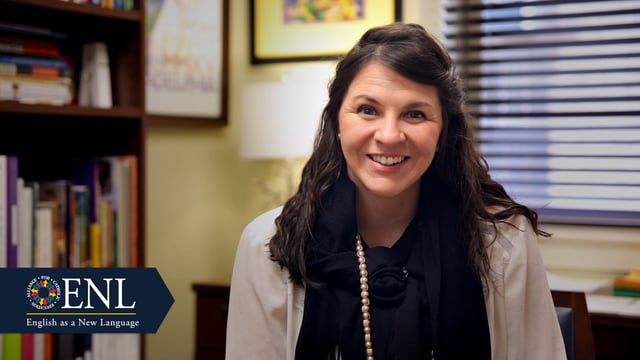The following article was contributed by Katy Lichon, Ph.D., Director, English as a New Language; Faculty, ACE Teaching Fellows, University of Notre Dame and Jenny Dees, M.Ed. Coordinator, English as a New Language, University of Notre Dame.
Catholic schools were founded over a century ago to serve immigrant and marginalized communities in a Gospel-centered environment that honored the inherent God-given dignity, gifts, and culture of each child. It is our aspiration that linguistically and culturally diverse students continue to benefit fully from a legacy of Catholic education serving their unique academic and cultural needs. We view this population of students as “roses” as shed by Our Lady of Guadalupe–signs of hope, a call to work diligently and with zeal, and a promise of fruitfulness for our schools.
Recently, we have been captivated by Pope Francis’ exhortation to reach out to the periphery, his pride in being from an immigrant family, and his identification with being an English language learner (ELL). ELLs are often found on the periphery of our classrooms–families set apart by accents, cultural worldviews, and challenges to academic achievement. As people of faith, we have a historically and biblically-rooted calling to serve the immigrant, our culturally diverse Church, and students on the periphery. We are called to ensure that all are welcomed and celebrated at one table in Catholic schools.
We are also called to ensure that this truly EXCEPTIONAL groups of students’ assets are recognized, honored, and served. We encourage schools to view multilingualism as a call for celebration and a gift. Our belief is that these students grace and enrich our schools, and that opening our doors wide makes us more authentically Catholic and better.
English language learners are children who speak a language other than English at home, and they are the fastest and largest growing population in U.S. schools. By the year 2020, ELLs, often called the “silent minority,” will represent one out of every four children in America’s schools. According to the U.S. Census Bureau, in 2050, the Hispanic school-aged population will outnumber the non-Hispanic Caucasian school-aged population. It should be noted that seventy percent of ELLs are native-born, and that eighty percent of ELLs speak Spanish as their first language.
Regrettably, English learners are some of the most vulnerable students in America’s schools, and we believe that Catholic schools can offer a bright future for these students. We are now beginning to collect data on this population of learners, but we know that students who attend Catholic schools are 42% more likely to graduate from high school and two and a half times more likely to graduate from college. So how can we make this a reality for all ELLs? How do we best support them?
The need for teachers formed in ENL best practice in Catholic schools is urgent. While the number of ELLs is sharply rising, the number of teachers and leaders formed and prepared to teach and care for them lags. Researchers in language acquisition, deJong and Harper (2013), report that less than twenty-five percent of teachers have ENL formation, and underscore that forming teachers prepared to address the unique challenges of language learners is key to their academic success. Catholic schools are faced with an urgent moral imperative to form teachers to affect student retention, motivation, confidence, and academic outcomes–all challenges faced by ELLs. We believe that English learning students deserve teachers and leaders with expertise in language acquisition, research-based instructional strategies, and culturally sustaining pedagogy. Please join us for our session where we will unpack these three domains and discuss what the English as a New Language program at the University of Notre Dame has learned in the past 12 years. We cannot wait to meet you and to develop ways to better serve our ELLs, as they are truly our legacy and our future.
Please join us at the 2017 NCEA New Directions Exceptional Learners Conference in Evanston, IL June 19-21, 2017.
